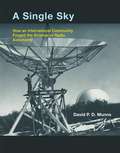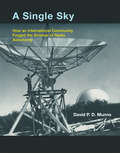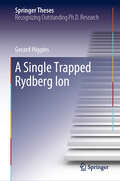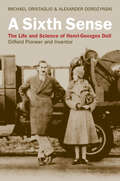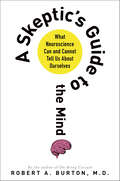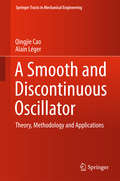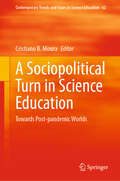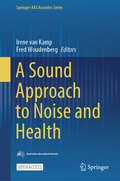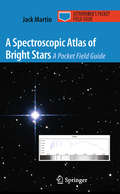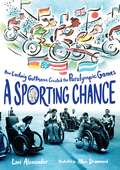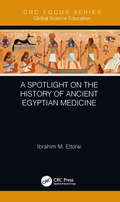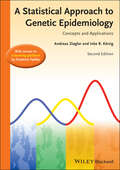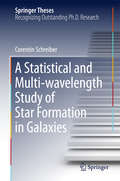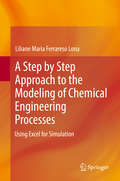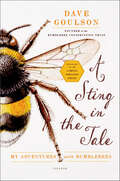- Table View
- List View
A Single Sky: How an International Community Forged the Science of Radio Astronomy
by David P. D. MunnsFor more than three thousand years, the science of astronomy depended on visible light. In just the last sixty years, radio technology has fundamentally altered how astronomers see the universe. Combining the wartime innovation of radar and the established standards of traditional optical telescopes, the "radio telescope" offered humanity a new vision of the universe. In A Single Sky, the historian David Munns explains how the idea of the radio telescope emerged from a new scientific community uniting the power of radio with the international aspirations of the discipline of astronomy. The radio astronomers challenged Cold War era rivalries by forging a united scientific community looking at a single sky.Munns tells the interconnecting stories of Australian, British, Dutch, and American radio astronomers, all seeking to learn how to see the universe by means of radio. Jointly, this international array of radio astronomers built a new "community" style of science opposing the "glamour" of nuclear physics. A Single Sky describes a communitarian style of science, a culture of interdisciplinary and international integration and cooperation, and counters the notion that recent science has been driven by competition. Collaboration, or what a prominent radio astronomer called "a blending of radio invention and astronomical insight," produced a science as revolutionary as Galileo's first observations with a telescope. Working together, the community of radio astronomers revealed the structure of the galaxy.
A Single Sky: How an International Community Forged the Science of Radio Astronomy (The\mit Press Ser.)
by David P.D. MunnsHow radio astronomers challenged national borders, disciplinary boundaries, and the constraints of vision to create an international scientific community.For more than three thousand years, the science of astronomy depended on visible light. In just the last sixty years, radio technology has fundamentally altered how astronomers see the universe. Combining the wartime innovation of radar and the established standards of traditional optical telescopes, the “radio telescope” offered humanity a new vision of the universe. In A Single Sky, the historian David Munns explains how the idea of the radio telescope emerged from a new scientific community uniting the power of radio with the international aspirations of the discipline of astronomy. The radio astronomers challenged Cold War era rivalries by forging a united scientific community looking at a single sky.Munns tells the interconnecting stories of Australian, British, Dutch, and American radio astronomers, all seeking to learn how to see the universe by means of radio. Jointly, this international array of radio astronomers built a new “community” style of science opposing the “glamour” of nuclear physics. A Single Sky describes a communitarian style of science, a culture of interdisciplinary and international integration and cooperation, and counters the notion that recent science has been driven by competition. Collaboration, or what a prominent radio astronomer called “a blending of radio invention and astronomical insight,” produced a science as revolutionary as Galileo's first observations with a telescope. Working together, the community of radio astronomers revealed the structure of the galaxy.
A Single Trapped Rydberg Ion (Springer Theses)
by Gerard HigginsSystems of trapped ions and systems of ultracold Rydberg atoms are used at the forefront of quantum physics research and they make strong contenders as platforms for quantum technologies. Trapped Rydberg ions are a new hybrid technology envisaged to have both the exquisite control of trapped ion systems and the strong interactions of Rydberg atoms.In this work a single trapped Rydberg ion is experimentally investigated. A trapped strontium ion is excited to Rydberg states using two ultraviolet lasers. Effects of the strong trapping electric fields on the highly-sensitive Rydberg ion are studied. After mitigating unwanted trap effects, the ion is coherently excited to Rydberg states and a quantum gate is demonstrated. This thesis lays much of the experimental groundwork for research using this novel system.
A Sixth Sense: The Life and Science of Henri-Georges Doll: Oilfield Pioneer and Inventor
by Michael Oristaglio Alexander DorozynskiThe true story of the French engineer and inventor who developed a mine detector for the US Army during WWII—and then went on to transform the oil industry. In March 1940, with Europe at war, French army lieutenant Henri-Georges Doll came to the U.S. embassy in Paris to give a deposition. Doll was an artillery commander, a graduate of France&’s grandes écoles of science, engineering, and service. He had been mobilized to the front at the start of the war, then quickly recalled to Paris to work on a secret device for detecting the deadly land mines being planted by the German army on a vast new scale. But Doll&’s deposition that day had nothing to do with the war. He had come to testify in a patent lawsuit pending in Houston, Texas. The case was Schlumberger Well Surveying Corporation v. Halliburton Oil Well Cementing Company: it marked one of the first great industrial battles for control of the technology of oil and gas exploration. When the German army marched into Paris three months later, Doll escaped to America, where he developed his new mine detector for the U.S. army, then settled in a small Connecticut town to become one of the most prolific inventors of the twentieth century. His sixth sense for applied science would help create the modern technology of seeing underground using electrical signals and sound waves—technology that would enable the explosive growth of oil production, and of Schlumberger, after the war. This biography tells his remarkable story.
A Skeptic's Guide to the Mind: What Neuroscience Can and Cannot Tell Us About Ourselves
by Robert A. BurtonWhat if our soundest, most reasonable judgments are beyond our control?Despite 2500 years of contemplation by the world's greatest minds and the more recent phenomenal advances in basic neuroscience, neither neuroscientists nor philosophers have a decent understanding of what the mind is or how it works. The gap between what the brain does and the mind experiences remains uncharted territory. Nevertheless, with powerful new tools such as the fMRI scan, neuroscience has become the de facto mode of explanation of behavior. Neuroscientists tell us why we prefer Coke to Pepsi, and the media trumpets headlines such as "Possible site of free will found in brain." Or: "Bad behavior down to genes, not poor parenting." Robert Burton believes that while some neuroscience observations are real advances, others are overreaching, unwarranted, wrong-headed, self-serving, or just plain ridiculous, and often with the potential for catastrophic personal and social consequences. In A Skeptic's Guide to the Mind, he brings together clinical observations, practical thought experiments, personal anecdotes, and cutting-edge neuroscience to decipher what neuroscience can tell us – and where it falls woefully short. At the same time, he offers a new vision of how to think about what the mind might be and how it works. A Skeptic's Guide to the Mind is a critical, startling, and expansive journey into the mysteries of the brain and what makes us human.
A Sleuth of Bears and Other Amusing, Beguiling, and Peculiar Collective Nouns
by Colter JacksonFrom a sleuth of bears solving a mystery to a parliament of owl judges, a romp of otters playing a game to a grumble of pugs exercising, this delightful picture book reveals the fun and surprising collective nouns of the animal kingdom in action!Join author-illustrator Colter Jackson on a journey of animals on land, in the air, and at sea that’s sure to entertain and educate young readers. From sloths and elephants to whales and flamingos, come learn about the humorous, surprising, and joyful collective nouns that describe our favorite groups of animals. A Sleuth of Bears features rhyming text and inviting watercolor illustrations that explore the many ways animals are busy all day, including a creep of tortoises commuting to work, a congregation of gators singing in a chorus, a colony of chinchillas sailing the sea, and a dazzle of zebras acting on stage. For animal-loving kids and eager language learners, this makes a beautiful gift that will be enjoyed again and again.SWEET & FUNNY NATURE BOOK FOR KIDS: An engaging read-aloud, A Sleuth of Bears and Other Amusing, Beguiling, and Peculiar Collective Nouns engages young readers on a learning journey to find out how groups of animals (with charming and hilarious names) spend their busy days. ANIMAL ART: Expressive, playful, and joyful, Colter Jackson's illustrations will delight young and old alike. An accomplished artist, her work has been published in the New York Times’ Modern Love column, Epoch Magazine, Tin House, Bellevue Literary Review, and more. She is the author of several children's books, all featuring wild and wonderful animals. VOCABULARY BUILDER: Informative and entertaining, this funny take on wildlife offers an excellent opportunity to explore nature with children and add terrific new words to their vocabulary.Perfect for: Kids who love animals and nature Parents and educators seeking fun and informative books for children Gift-giving for kids ages 4 - 8 Readers who enjoy clever zoology books like The Atlas of Amazing Birds and An Anthology of Intriguing Animals
A Slimy Story (Science Solves It!)
by Michelle KnudsenSlimy! Yucky! Wriggly! Dan is grossed out by earthworms until one of them hitches a ride in his pocket—and creates a sensation in school!
A Slot Machine, A Broken Test Tube: An Autobiography (Sloane Foundation)
by S. E. LuriaThis is the autobiography of Nobel Prize winning Salvador E. Luria. Luria was one of the founders of molecular biology, a renowned professor and teacher at several major universities including MIT where he also was the first director of the Cancer Center. He was also an anti-Vietnam war activist and champion of all causes to reduce social and financial inequality.
A Small Dose of Toxicology: The Health Effects of Common Chemicals
by Steven G. GilbertEveryday, we come into contact with many relatively harmless substances that could, at certain concentrations, be toxic. This applies not only to obvious candidates such as asbestos, lead, and gasoline, but also to compounds such as caffeine and headache tablets. While the field of toxicology has numerous texts devoted to aspects of biology, chemis
A Smooth and Discontinuous Oscillator: Theory, Methodology and Applications (Springer Tracts in Mechanical Engineering)
by Marian Wiercigroch Qingjie Cao Alain LégerThis is the first book to introduce the irrational elliptic function series, providing a theoretical treatment for the smooth and discontinuous system and opening a new branch of applied mathematics. The discovery of the smooth and discontinuous (SD) oscillator and the SD attractors discussed in this book represents a further milestone in nonlinear dynamics, following on the discovery of the Ueda attractor in 1961 and Lorenz attractor in 1963. This particular system bears significant similarities to the Duffing oscillator, exhibiting the standard dynamics governed by the hyperbolic structure associated with the stationary state of the double well. However, there is a substantial departure in nonlinear dynamics from standard dynamics at the discontinuous stage. The constructed irrational elliptic function series, which offers a way to directly approach the nature dynamics analytically for both smooth and discontinuous behaviours including the unperturbed periodic motions and the perturbed chaotic attractors without any truncation, is of particular interest. Readers will also gain a deeper understanding of the actual nonlinear phenomena by means of a simple mechanical model: the theory, methodology, and the applications in various interlinked disciplines of sciences and engineering. This book offers a valuable resource for researchers, professionals and postgraduate students in mechanical engineering, non-linear dynamics, and related areas, such as nonlinear modelling in various fields of mathematics, physics and the engineering sciences.
A Sociological Approach to Health Determinants
by Toni SchofieldA Sociological Approach to Health Determinants investigates how 'the social' works in determining health and health inequity. Taking a global perspective, the book shines a light on how experiences of health, illness and health care are shaped by a variety of complex social dynamics. Informed primarily by sociology, the book engages with the WHO's social determinants of health approach and draws on contributions from history, political economy and policy analysis to examine issues such as class, gender, ethnicity and indigeneity, and the impact they have on health. <P> A Sociological Approach to Health Determinants is a comprehensive resource that provides a new perspective on the influence of social structures on health, and how our understanding of the social can ensure improved health outcomes for people all over the globe.
A Sociopolitical Turn in Science Education: Towards Post-pandemic Worlds (Contemporary Trends and Issues in Science Education #62)
by Cristiano B. MouraThis edited volume features a collection of essays on the COVID-19 pandemic and associated crises and its implications for science education research and practice from a socio-political perspective. Taking the pandemic as a starting point – and understanding the pandemic as an event that exposes science-society relationships in their complexities –, this book sets provocations for the science education community, analyzing aspects of its practices, conceptualizations, aims, core values, research traditions, institutions, affectivities, and aesthetics from diverse points of view, and proposing new postures for the future of science education. Some central themes to science education research such as the concepts of scientific literacy and nature of science (among others) are revisited, and new perspectives related to affects, multiculturalism and the knowledge-power relationships are explored. This book brings together authors from diverse backgrounds, geographic origins, and academic trajectories, composing a truly international volume with a plurality of voices weaving a rich caleidoscope seeking to analyze science education's current state of affairs and propose diverse futures under a socio-political perspective.
A Solar-Powered Planet (Into Reading, Level V #59)
by Bill Wood Jill McDougallNIMAC-sourced textbook.
A Sound Approach to Noise and Health (Springer-AAS Acoustics Series)
by Irene Van Kamp Fred WoudenbergThis open access book highlights the negative and positive health effects of chronic exposure to environmental sound. It describes the state of the art in the field from a public health point of view and puts it in a broad societal perspective looking at sound from physical, social, psychological, economic and governance angles. Rather than a mere collection of papers around the theme as usually provided in special issues, this book offers a comprehensive look at the meaning of sound in society and its impacts and provides directions to further advance the field.
A Space Traveler's Guide to the Solar System
by Mark ThompsonAn eye-opening and provocative tour of our solar system, from one of Britain’s celebrated astronomists. Have you ever dreamed of being an astronaut, traveling through the universe on your very own space mission? What would it be like to tour the solar system, visiting the sun and the planets, taking in everything from moons to asteroid belts along the way? What would you see, and how would you feel? What would you eat? How would you navigate and produce fuel? How would you survive? On this epic voyage of discovery, astronomer Mark Thompson takes you on that journey. From how to prepare for take-off and the experience of leaving Earth’s atmosphere, to the reality of living in the confines of a spaceship and the strange sensation of weightlessness, this is an adventure like no other. Suit up, strap in, and enjoy the ride!
A Spectroscopic Atlas of Bright Stars: A Pocket Field Guide (Astronomer's Pocket Field Guide)
by Jack MartinA Spectroscopic Atlas of the Stars: A Pocket Field Guide is a standard reference book for all amateur astronomers interested in practical spectroscopy or spectrography. For the first time in one place, it identifies more than 70 (northern hemisphere) bright stars that are suitable observational targets for both amateurs and astronomy students. Finder charts are provided for locating these sometimes-familiar stars. Data for each star includes labelled stellar spectra, a spectral profile with spectral lines identified. These are conveniently laid out on a single page, opposite tables of spectroscopic properties, and lines and wavelengths identified. This is the first Spectral Atlas designed for amateur astronomers. It is equally relevant to college undergraduates, being intended to familiarize astronomers of any age and level of knowledge with labelled stellar spectra and their different properties. It contains much information about stars which is hard to find or inaccessible to most people.
A Sporting Chance: How Ludwig Guttmann Created the Paralympic Games
by Lori AlexanderTelling the inspiring human story behind the creation of the Paralympics, this young readers biography artfully combines archival photos, full-color illustrations, and a riveting narrative to honor the life of Ludwig Guttmann, whose work profoundly changed so many lives. <P><P>Dedicating his life to helping patients labeled “incurables,” Ludwig Guttmann fought for the rights of paraplegics to live a full life. The young doctor believed—and eventually proved—that physical movement is key to healing, a discovery that led him to create the first Paralympic Games. <P><P>Told with moving text and lively illustrations, and featuring the life stories of athletes from the Paralympic Games Ludwig helped create, this story of the man who saved lives through sports will inspire readers of all backgrounds.
A Spotlight on the History of Ancient Egyptian Medicine (Global Science Education)
by Ibrahim EltoraiThis unique volume provides the reader with an outline of ancient Egyptian civilization, history and culture. It reviews the ancient Egyptian understanding of human health and disease, medical and herbal treatments for various conditions based on primary sources found in ancient papyri. The reader will also gain an insight into the influence of ancient Egyptian medical knowledge on later civilizations including ancient Greek and Islamic scholars in the middle ages. There are two chapters that focus on the ancient Egyptian understanding and treatments of cardiovascular disease as well as a description of herbal medicines used by medical practitioners and pharmacologists. Key Features: Describes influence of ancient Egyptian medical and pharmaceutical knowledge of subsequent civilizations Explores ancient Egyptian pharmacology and herbal medicine Review of the most significant ancient Egyptian papyri documenting medical knowledge and practice Concise overview of ancient Egyptian history, culture, medical knowledge Summary of ancient Egyptian understanding of cardiovascular diseases and treatments
A Star Is Born
by Amy TaoOur sun is great at shining down light and heat on earth, but was the sun always that bright? With the help of gravity, the sun is eventually able to produce enough energy to give off light. Our sun has kept this up for four billion years and will keep shining for another five billion years!
A Star's Life: The Inside Story
by Liz Huyck Mark HicksDo you know how a star is born? Meet Stella, the star! Follow her as she shows you how stars form, live, and eventually go supernova! You will learn these processes as you meet her family—the Sun, Big Blue, and Supergiant. You will see how these different kinds of stars are able to use forces, such as gravity, atoms, and different elements help to create the beautiful night sky. Stella will help you understand how the millions of stars are able to dazzle you every night.
A Star's Story
by Rachel YoungThe Sun is our closest star. Stars produce heat, light, and do not orbit other celestial objects.
A Statistical Approach to Genetic Epidemiology: Concepts and Applications, with an e-Learning Platform
by Friedrich Pahlke Andreas Ziegler Inke R. KônigThis is the second edition of the successful textbook written by the prize-winning scientist Andreas Ziegler, former President of the German Chapter of the International Biometric Society, and Inke Konig, who has been teaching the subject over many years. The book gives a comprehensive introduction into the relevant statistical methods in genetic epidemiology. The second edition is thoroughly revised, partly rewritten and includes now chapters on segregation analysis, twin studies and estimation of heritability. The book is ideally suited for advanced students in epidemiology, genetics, statistics, bioinformatics and biomathematics. Like in the first edition the book contains many problems and solutions and it comes now optionally with an e-learning course created by Friedrich Pahlke. This e-learning course has been developed to complement the book. Both provide a unique support tool for teaching the subject.
A Statistical and Multi-wavelength Study of Star Formation in Galaxies (Springer Theses)
by Corentin SchreiberThis thesis presents a pioneering method for gleaning the maximum information from the deepest images of the far-infrared universe obtained with the Herschel satellite, reaching galaxies fainter by an order of magnitude than in previous studies. Using these high-quality measurements, the author first demonstrates that the vast majority of galaxy star formation did not take place in merger-driven starbursts over 90% of the history of the universe, which suggests that galaxy growth is instead dominated by a steady infall of matter. The author further demonstrates that massive galaxies suffer a gradual decline in their star formation activity, providing an alternative path for galaxies to stop star formation. One of the key unsolved questions in astrophysics is how galaxies acquired their mass in the course of cosmic time. In the standard theory, the merging of galaxies plays a major role in forming new stars. Then, old galaxies abruptly stop forming stars through an unknown process. Investigating this theory requires an unbiased measure of the star formation intensity of galaxies, which has been unavailable due to the dust obscuration of stellar light.
A Step by Step Approach to the Modeling of Chemical Engineering Processes
by Liliane Maria Ferrareso LonaThis book treats modeling and simulation in a simple way, that builds on the existing knowledge and intuition of students. They will learn how to build a model and solve it using Excel.Most chemical engineering students feel a shiver down the spine when they see a set of complex mathematical equations generated from the modeling of a chemical engineering system. This is because they usually do not understand how to achieve this mathematical model, or they do not know how to solve the equations system without spending a lot of time and effort.Trying to understand how to generate a set of mathematical equations to represent a physical system (to model) and solve these equations (to simulate) is not a simple task. A model, most of the time, takes into account all phenomena studied during a Chemical Engineering course. In the same way, there is a multitude of numerical methods that can be used to solve the same set of equations generated from the modeling, and many different computational languages can be adopted to implement the numerical methods. As a consequence of this comprehensiveness and combinatorial explosion of possibilities, most books that deal with this subject are very extensive and embracing, making need for a lot of time and effort to go through this subject. It is expected that with this book the chemical engineering student and the future chemical engineer feel motivated to solve different practical problems involving chemical processes, knowing they can do that in an easy and fast way, with no need of expensive software.
A Sting in the Tale: My Adventures with Bumblebees
by Dave GoulsonFOLLOWING IN THE FOOTSTEPS OF GREAT NATURE WRITERS SUCH AS E.O. WILSON AND CHARMING MEMOIRS LIKE GERALD DURRELL'S MY FAMILY AND OTHER ANIMALS, THIS FASCINATING BOOK WILL ALTER THE WAY WE THINK ABOUT BUMBLEBEES.Dave Goulson became obsessed with wildlife as a small boy growing up in rural Shropshire, starting with an increasingly exotic menagerie of pets. When his interest turned to the anatomical, there were even some ill-fated experiments with taxidermy. But bees are where Goulson's true passion lies—the humble bumblebee in particular.Once commonly found in the marshes of Kent, the English short-haired bumblebee went extinct in the United Kingdom, but by a twist of fate still exists in the wilds of New Zealand, the descendants of a few pairs shipped over in the nineteenth century. Dave Goulson's passionate quest to reintroduce it to its native land is one of the highlights of a book that includes original research into the habits of these mysterious creatures, history's relationship with the bumblebee, and advice on how to protect the bumblebee for future generations.One of the United Kingdom's most respected conservationists and the founder of the Bumblebee Conservation Trust, Goulson combines lighthearted tales of a child's growing passion for nature with a deep insight into the crucial importance of the bumblebee. He details the minutiae of life in the nest, sharing fascinating research into the effects intensive farming has had on our bee population and the potential dangers if we are to continue down this path.
